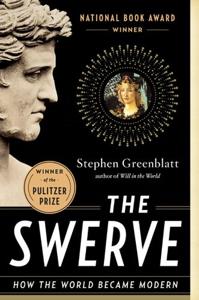
Want to learn the ideas in Swerve better than ever? Read the world’s #1 book summary of Swerve by Stephen Greenblatt here.
Read a brief 1-Page Summary or watch video summaries curated by our expert team. Note: this book guide is not affiliated with or endorsed by the publisher or author, and we always encourage you to purchase and read the full book.
Video Summaries of Swerve
We’ve scoured the Internet for the very best videos on Swerve, from high-quality videos summaries to interviews or commentary by Stephen Greenblatt.
1-Page Summary of Swerve
Overview
In the 1400s, nobody had ever read Lucretius’ On the Nature of Things. Scholars and book hunters could only guess what it contained based on other books that mentioned it.
Once De rerum natura was released from its captivity in a monastic library, it unleashed revolutionary change. People started to think scientifically and were less fearful of punishment in the afterlife.
The Book Hunter
In January 1417, Poggio Bracciolini went to monasteries in southern Germany looking for ancient manuscripts. At the time, curiosity was considered a sin by the Catholic Church and there were few literate people even in this prosperous region.
Poggio was a writer, but he became unemployed when the papal bureaucracy changed hands. He had been in close proximity to Pope John XXIII and had risen to the level of apostolic secretary, but then there were two popes instead of one. Poggio chose freedom over employment as an apostolic secretary and decided to pursue his passion for book collecting.
The Moment of Discovery
By 1417, Italians had been book hunting for almost a century. In the 1300s, Petrarch found and pieced together Livy’s History of Rome from old manuscripts in monasteries. The people who did this were called humanists, and they set the groundwork for what we now know as humanities.
For centuries, monasteries were the only places that valued books. With the fall of the Roman Empire came a decline in education and literacy, so monks took up reading to keep their minds active. This led to a diagnosis for people who became despondent from reading too much: acaedia (from Greek ακαδημια = “despondency”), which is basically depression caused by over-reading or lack of activity.
Those who didn’t read were punished. They were forced to sit in a chair and be ridiculed by the other monks, until they complied with the rules. Even when they weren’t reading, they were still required to read at mealtimes because discussion of ideas was forbidden.
Books were made of papyrus. They had the tendency to fall apart after continued use, so monasteries would constantly purchase new books. Trade with Egyptian papyrus makers was non-existent during the Middle Ages, so manuscripts were more often copied onto parchment, which came from sheepskin or recycled old codices (notebooks). Monks who ran libraries were very protective of their books because they didn’t want them stolen.
Poggio was the perfect person to transcribe these ancient texts. He had a lot of experience in the field and was very good at it. His handwriting, accuracy, and speed were all excellent.
Poggio likely visited the Abbey of Fulda in 1417. In the ninth century, that abbey was served by Abbott Rabanus Maurus, who made Fulda’s library one of the most intellectually rich libraries in Germany. Poggio resurrected Lucretius’ De rerum natura (On the Nature of Things) from there.
In Search of Lucretius
A philosopher named Lucretius wrote a book called De rerum natura in 54 BCE. It was very famous because it was considered to be one of the most powerful books ever written on philosophy. Cicero disagreed with him, but he believed that it was a masterpiece and said so publicly. Virgil’s Aeneid is thought to have been written as a response to De rerum natura. Ovid called it sublime, which means “of great beauty.” However, St. Jerome hated this book so much that he claimed (probably falsely) that Lucretius had taken a love potion and gone mad in an attempt to discredit his work.
De rerum natura was written at a time when the ancient Roman and Greek gods were no longer worshipped. It was also before Jesus Christ arrived in Palestine. In this intellectual climate, Lucretius saw Epicurus as godlike because of his ideas on atoms and pleasure. Epicurean philosophy stated that everything is made up of tiny particles called atoms that have no value or meaning to them. This belief led to the conclusion that there’s an explanation for all seemingly mystical phenomena, as well as a lack of afterlife (since one can’t be punished or rewarded). However, this idea did not sit well with Jewish and Christian theologians who viewed it as heresy since they believed in an afterlife where people would be judged based on their actions while alive.






